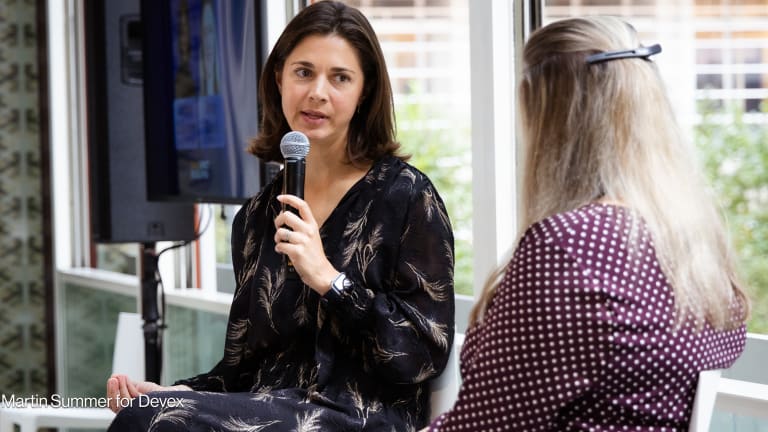
Investing in refugees can be good business — even if the immediate source of profit is not clear. And connecting with an international business on a local development project could pay off — though the connection at first might seem murky.
Those were the conclusions of the two-day Shared Value Leadership Summit, which wrapped up Wednesday in New York City, and where the growth of public-private partnerships and maximizing business opportunities in all sectors of development, from climate change to refugee migration, was a constant theme.
Louise Kjaer, the chief executive officer and founder of Kjaer Advice, a Denmark-based consulting firm that connects and coaches various businesses, NGOs, governments and academia, was on hand to offer advice from the field.
“It’s time to disrupt our traditional thinking of humanitarian assistance and development,” she told one panel session. “NGOs need to understand businesses are not evil, governments need to trust new kinds of partners, and businesses need to understand what NGOs are doing.”
Devex talked with Kjaer, who has a background in conflict mediation at the United Nations, about what it takes to bridge the gap between the sectors. What follows is a condensed version of our conversation, edited for length and clarity.
You talked about a year-old partnership between Grundfos, the pump manufacturer, and the Danish Refugee Council at a refugee camp in Jordan. How is this partnership working? You said it is difficult in a situation like this to actually make a profit.
In this first phase, they are making a comparative study of different kinds of water solutions, one being the more traditional: Very basic water solutions that are normally applied in an emergency where people are not likely to stay for a long time. In this project, we wanted to see what the difference is between a solid investment in sustainable, solar driven water pumps of a better quality — how many more people can benefit and ultimately the cost benefit of applying this solution, compared to a cheap solution that does not last very long. So, there was an upfront investment on behalf of the company, where they actually supply these solar driven pumps in order for the academic, comparative research to take place. That will take some time.
“I am convinced there will be a huge business opportunity once it becomes clear to the world that we are wasting a lot of money by providing unsustainable solutions.”
— Louise Kjaer, CEO and founder of Kjaer AdviceIf your question is about the business return, the honest answer is that we have no idea. It is way down the road that we will generate a business income for this. But this is an extremely important signal. It is an innovation of the company’s whole way of thinking. But it is a first example of anybody in this sector taking a serious and intelligent look at improving some of the solutions that are currently being applied in this sector. I am convinced there will be a huge business opportunity once it becomes clear to the world that we are wasting a lot of money by providing unsustainable solutions. Because this is not a refugee camp that goes away — they become communities of their own and people will stay there. So, of course, it makes much more sense to make solid infrastructure solutions initially. We are not talking about high level, high tech solutions. But we are talking about much better solutions adapted to the particular environment.
When you talk with companies, do you find you often have to explain that it might take a while before they see a return on this type of partnership? Are they amenable to that idea typically?
I think I don’t need to explain it too much, because it is becoming very apparent in this world. Any business will not last if they don’t adjust their whole purpose to something that will serve society at large.
What would you recommend to an NGO that may not speak exactly the same language as a potential business partner, and is trying to forge a new relationship with them?
I think you always have to make the effort of trying to walk in the other partner’s shoes, or at least try to understand what is the value to them, what is in it for them. If I am to approach a government official, why would I take his or her time, why would it serve this government official? Same thing with business. I would not approach a supermarket if I wanted to work in health, for instance. So we do a bit of research and we figure out, “Oh, this company might be interested in the region in the world where I am operating and I can tell them about this opportunity for doing business, because they are certainly in the need of this particular product where I am operating.” You have to do a bit of research so you have to put yourself in the position of the company you are trying to approach.
And that can be hard for people from the NGO sector to do, initially?
Q&A: A private sector 'productivity tool' to eliminate poverty is catching on around the world
Poverty Stoplight, a visual survey that uses a series of photographs for families to self-assess their level of poverty, is Fundación Paraguaya founder Martin Burt's idea of eliminating multidimensional poverty. Now, the private sector is finding its own use for the tool.
I think the NGO sector is so unprepared for this. I have worked in an NGO, I started one, I worked in government, I worked in business. I have worked in all these sectors, so I know exactly what the drivers are in each of these sectors. And the NGO sector — if we should generalize — is accustomed to receiving membership fees, or donations. It is a completely new ballgame to approach somebody to offer them the NGO’s value proposition. It is a language they are not used to speaking. So as an NGO you have to be very professional about offering your service to a business. Why can you add value to a business? Why take their time? What is it you can actually do — how can you catch their interest?
Very often, in my view, it is about the unique access the NGO has to a specific target audience. So you have to explain that, and explain how that can become profitable for that particular business — that is called marketing in the business world, but NGOs are not used to doing that at all. You have to turn the chip in your own head and understand this can help you fulfill your own mandate.
So it is an increasing necessity?
I think so, yes. We should not compartmentalize our different potential roles in society, we should join forces much more fiercely, with an open mind. We should not be stupid or ignorant, we should be prepared to meet different kinds of partners. We need to train NGOs to understand what it takes. I have trained a lot of NGOs, and they are all crying because money is becoming a lot more scarce. My point of view is, you have to turn your whole identity around and look at what you can offer on the market.
It should not be a giving situation. You should actually go to the market and create partnerships where you sell your knowledge, your services, credibility and your access to government — all these kinds of things. That is a commodity that is worth a lot.
Read more international development news online, and subscribe to The Development Newswire to receive the latest from the world’s leading donors and decision-makers — emailed to you free every business day.








